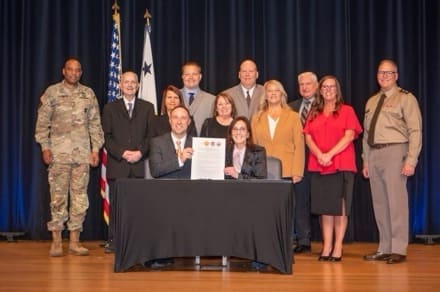
The Army and a Minnesota Service Cooperative have formalized a 10-year renewable partnership to sustain garrisons across the nation.
In a Pentagon signing ceremony on Wednesday, April 10, Assistant Secretary of the Army for Installations, Energy and Environment Rachel Jacobson said she was excited to partner with Sourcewell, the Minnesota local unit of government that provides cooperative purchasing nationwide to help local, state, and federal agencies operate efficiently.
The partnership with Sourcewell is the largest the Army has ever initiated, Jacobson said.
“We’re using Intergovernmental Support Agreements more and more,” she said in a ceremony held in the Pentagon Auditorium.
The Army estimates that the IGSA with Sourcewell will result in annual savings of between 15% and 50% on a wide range of services, supplies and equipment, while giving each garrison a flexible and efficient alternative to current contract options.
Sourcewell CEO Chad Coauette said the organization’s mission is to be a force qualifier for government, so the partnership with the Army fits perfectly in its programming.
The organization and the Army worked for months nailing down the specifics of the wide-ranging contract, and Coauette said Sourcewell is scaling up its process to meet the needs of the Army to provide efficient and effective procurement.
The self-sustaining service organization plows profits back into Minnesota communities, offering training programs for teachers, firefighters and the like, Coauette said.
Effective and efficient contracting
Jacobson said Army installations are small cities, so partnering with a procurement agency that already works with hundreds of government entities made sense.
“We have a lot of municipal needs,” she said.
Sourcewell already works with a variety of government agencies of all sizes, from the Federal Aviation Administration and Federal Reserve banks to the Kentucky State Fair Board and the city of Abbeville, Ala.
Attending the signing ceremony representing the Army commands engaged with the new partnership were Deputy Chief of Staff for Installations Lt. Gen. Kevin Vereen and Army Installation Management Command deputy commanding general Maj. Gen. Joseph Ricciardi.
The Sourcewell partnership allows commands to find effective ways to buy the most efficient products, not just for serving the Army but the nation at large.
David Leinberger, the manager of Army Community Partnerships, welcomed the official party and participants to the signing ceremony, saying that Army Installation Management Command had done an amazing job negotiating with Sourcewell to institute the new procurement agreement.
“We’re expected to be responsible stewards of taxpayer dollars,” Leinberger said after the ceremony.
“This is an efficient use of taxpayer dollars,” he said.
Private partners in similar contracts focus on turning a profit, Leinberger said, and public partners do not.
“Public partners work at cost, and public partners do not have an incentivized reason to be dishonest or cut corners in order to turn a profit at the expense of the government,” he said.
The exciting thing about the Sourcewell partnership is that all Army installations in the continental United States benefit because they now have Sourcewell as an option to purchase or procure the supplies or services needed, he said.

“We look for ways to save money and find efficiencies,” he said.
The signing ceremony represented more than a year of effort by Army officials and Sourcewell to bring the partnership to fruition.
“On behalf of the Army, I just want to say that we recognize the commitment Sourcewell is bringing, not just to the Army but after this we have a business meeting with our other service partners, and we’re looking forward to working in a joint environment across all the services to make sure not just the Army gets the benefit of what we’re doing here, but all services,” Leinberger said.
He said the benefit for the Army in the new procurement agreement is wide ranging.
“The Army has a greater requirement that we actually have the money for,” he said.
Garrison planners can look forward to using Sourcewell in planning post maintenance and construction.
“We need toilets, we need sinks, we need light fixtures, we need doors, we need drywall, we need construction material; the unglamorous of running things, and we need in bulk,” he said.
The process now allows the Army to deal directly with suppliers and to buy at a cheaper rate than is available today.
Sourcewell takes the new partnership very seriously, Leinberger said, as evidenced by a large turnout of Sourcewell staff at the signing ceremony, including Coauette and Sourcewell Board of Directors Chairperson Greg Zylka.
The mayor of Little Falls, Minn., Zylka said the primary motivation for Sourcewell across the board is service.
“This ceremony is a celebration of service,” he said.
Saving through state partnerships
Assistant Secretary Jacobson said she hopes the other military branches do join the Army in finding efficiencies through Sourcewell and noted that the Army is aggressively negotiating Intergovernmental Support Agreements with local and state agencies nationwide to reduce costs and secure efficient and timely services.
The Army has signed an agreement with the State of Texas for the state Department of Transportation to provide all road maintenance on all Army installations in the state.
“That’s going to save us close to $4 million,” she said.
Likewise, a new agreement with the University of Georgia will help the Army identify regional climate hazards it can develop a climate management plan for southeastern garrisons.
Leinberger said the Army will need to do garrison procurements through Sourcewell for up to a year before it can put a dollar amount on the savings, but he and others believe it will be substantial.
By Jonathan Austin, Army News Service

